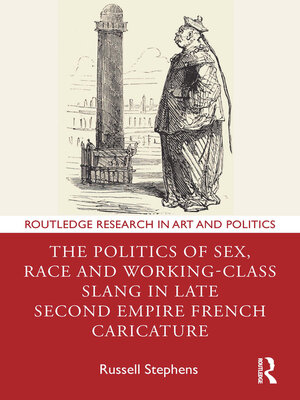The Politics of Sex, Race and Working-Class Slang in Late Second Empire French Caricature
ebook ∣ Routledge Research in Art and Politics
By Russell Stephens

Sign up to save your library
With an OverDrive account, you can save your favorite libraries for at-a-glance information about availability. Find out more about OverDrive accounts.
Find this title in Libby, the library reading app by OverDrive.



Search for a digital library with this title
Title found at these libraries:
| Library Name | Distance |
|---|---|
| Loading... |
This study examines caricatures as they appeared within popular Parisian magazines in mid-19th century France at the time of the 1867 World's Fair. Chapters compare the comic mockery of several of the most important satirists of this time, including Amédée de Noé, or "Cham" (1818–1879) as he was more popularly known, and Honoré Daumier (1808–1879). A major theme within the analysis is how these caricaturists secretly used argot (street slang), as documented in two slang dictionaries by Parisian litterateur, Alfred Delvau (1825–1867), within their comic images to carry hidden encrypted messages in order to evade the censorship of the day. The book focuses primarily on caricatures of Chinese visitors who were part of the 1866 diplomatic visit to Paris and images of Chinese at the 1867 Exposition Universelle, showing how the satires which were published by Cham used argot to create highly sexualised images that were often racist in nature. In contrast, the volume proposes that Daumier used slang in his caricatures to challenge racism and to make secret reference to current political leaders and politics. The book will be of interest to scholars working in art history, visual culture, media studies, and communication studies.







